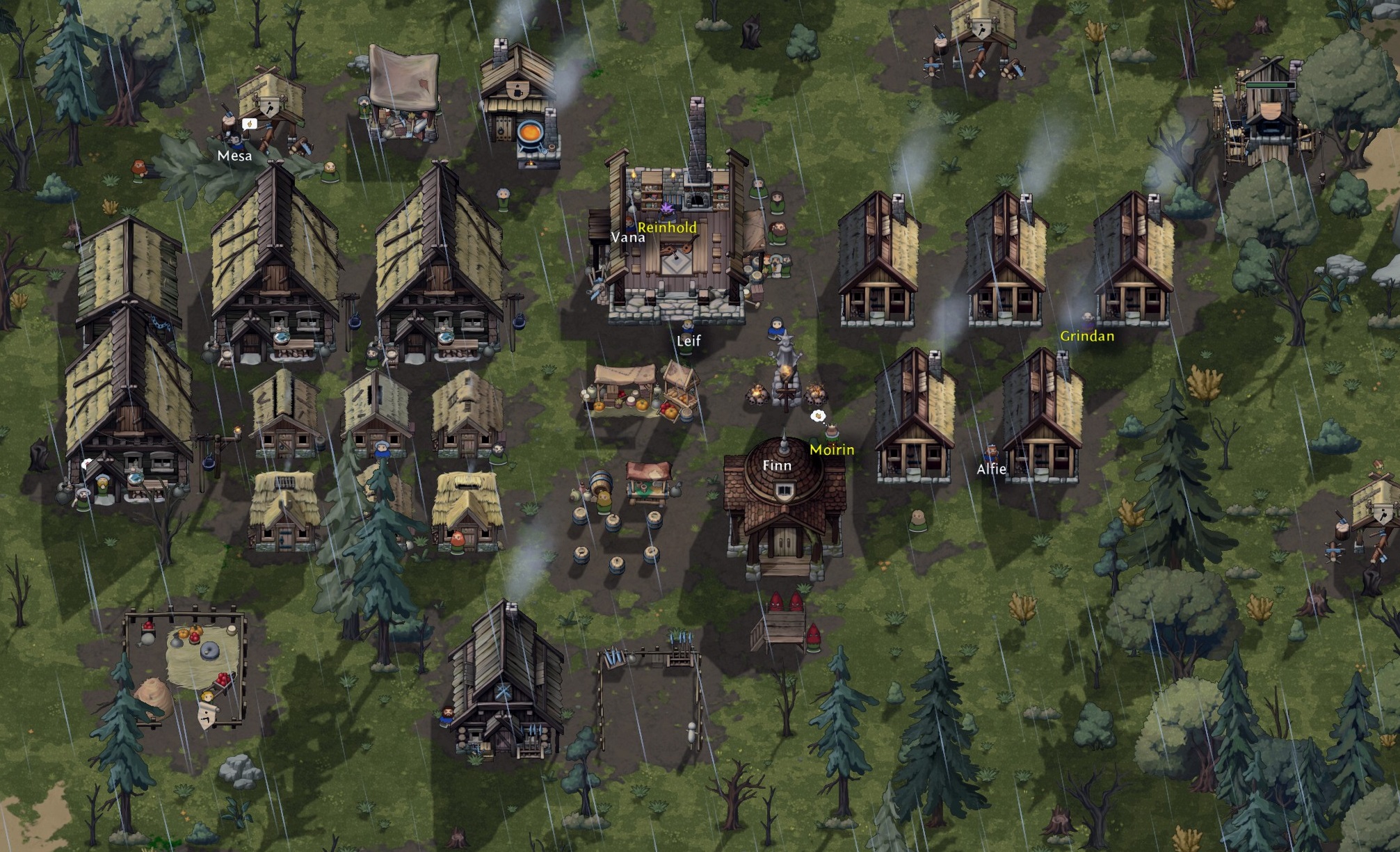
The one thing peasants and nobles have in common is an inability to hold their booze.
Any videogame chimeras that try to splice Crusader Kings with something else immediately get my attention—Paradox’s grand strategy RPG has been keeping me embroiled in intrigue and war for a long-ass time, but it’s always exciting to see what spin another developer puts on the dynastic soap opera. In Norland, the concepts of Crusader Kings share the spotlight with RimWorld’s colony-building survival sandbox, and it’s a marriage made in Heaven.
This is in stark contrast to the marriages between my aristocrats. Starting a new game in the Steam Next Fest demo, I created a trio of nobles to directly control, but as soon as I arrived in my settlement I found one of them was missing—the queen. Bandits had kidnapped her. Instead of the couple being able to forge lasting bonds, my queen was dealing with literal bonds, shackled as she was in a bandit camp.
(Image credit: Long Jaunt)
Before I could put together a wee army to rescue her, planning and infrastructure were required. Unlike RimWorld, where you start with a few colonists, Norland gives you a burgeoning village straight away, complete with hard-working peasants. Unlike your noble dynasty, the denizens of your settlement, which include slaves and warriors as well as peasants, aren’t controlled directly. Instead, nobles have to be assigned to buildings as managers, shaking their little fists at their workers.
Hands-on boss
It’s a very generous interpretation of how lords and ladies run their holdings. Sure, you’ll see them chugging goblets of booze or strumming a few notes on a lute, but in Norland they generally work as hard as everyone else. And because you only start with two nobles (at least until you rescue the third) they have to manage a lot of buildings. Thankfully they don’t have to stand there being the big boss all day. They follow a schedule, where they move from building to building, assigning tasks and then letting the citizens get on with things.
Peasants can be made to serve in an army, but they aren’t very good at warfare, so for my rescue attempt I hired some mercenaries. While I waited for them I built a new dormitory, since migrants were already appearing, an altar, a lumberjack’s hut, a library and some fields, and very quickly had a self-sustaining settlement. Construction isn’t nearly as big a job as it is in RimWorld, since you’re plonking down premade structures instead of laying everything out manually and customising the interiors. Pop down a house and everything is already set up for the new residents.
(Image credit: Long Jaunt)
In the time it would have taken me to erect just a couple of buildings in RimWorld, I already had a bustling village in Norland. There’s a downside to this, however, because there just isn’t much flexibility. Take a lord’s house, for instance: every noble requires their own home, even if they are married, because they only contain a single bed. This includes children, too. This makes housing your aristos a real resource and space hog. It’s not entirely inflexible, though. Every building can be upgraded, allowing more people to use it at the same time, and that includes homes. Unfortunately, upgrading a lord’s house necessitates some research, and I never got access to the specific book required for that project.
In the time it would have taken me to erect just a couple of buildings in RimWorld, I already had a bustling village in Norland.
After keeping myself busy for an in-game day, my mercs had arrived, so I created a squad with the king as commander, armed them and sent them off to the bandit camp. A few seconds later, exhausted from numerous management tasks, my king decided to lie down on the grass, where he stayed for the rest of the day, until a kindly soul carried him to bed. The next day, he woke up, greeted a new citizen, and then beat the absolute shit out of him. That’s just how we say “hello” in this neck of the woods. Clearly he was itching for violence, so I sent him off to the bandit camp once more.
Nobles, messengers and armies can travel across the map for all sorts of reasons—not just daring rescues. You might need to collect tithes from other settlements in your realm, trade with other kingdoms, eradicate threats or propose marriage. Characters from other realms will also visit you, allowing you to conduct diplomacy without having to traipse across the world.
(Image credit: Long Jaunt)
Since you start in a somewhat vulnerable position, it’s a good idea to keep your neighbours happy, or even agree to become a more powerful kingdom’s vassal. Probably don’t do what I did, when I got so angry with another king for trying to blackmail me that I decided to capture him. Three kingdoms declared war straight away, and then a few minutes later the king simply ran away because I’m a total idiot and didn’t construct a building to hold prisoners.
Bandits and booze
My squad of hired heroes performed admirably, cutting down the bandits and rescuing the queen. They even managed to get their hands on some loot. My king did get a bit banged up, though, but quickly cheered up when he got back home to find a new brewery and tavern had been erected. He wasn’t the only one who was stoked about the booze. Everyone partied far too hard, and the next morning was an unmitigated disaster. There were a lot of green faces, and while all of my diligent villagers showed up for work, they also brought with them plenty of stomach bile, which they promptly vomited up all over the place. The fields became a swamp of foul-smelling ichor. It was awful.
The kingdom’s primary boozehound turned out to be the wife of the king’s brother. She was the daughter of a neighbouring monarch and her stats suggested she’d be a real boon to the dynasty. And she was very effective, until she got some drink in her. There were snide remarks, fights, and at one point she burst into the library where her husband and brother-in-law were researching new farming techniques, shouted at them and then spewed up all over them. Then she left.
(Image credit: Long Jaunt)
At the same time, the queen was being bribed by another monarch, reducing her loyalty to the throne. Bribery, blackmail, kidnapping, murder—all the classic Crusader Kings activities are here. It’s enough to make you question the concept of marriage, but just like Crusader Kings, heirs are one of the most important resources in the game, so you just have to put up with the risk of betrayal so you can spawn some little goblins to carry on the dynasty. Speaking of which, I felt very embarrassed when I spotted the king and queen getting up to some pixelated hanky panky one evening, complete with Sims-like censoring. I couldn’t look them in the eye the next morning.
Bribery, blackmail, kidnapping, murder—all the classic Crusader Kings activities are here.
Throughout all of this, I was getting news from abroad. A new cult was creating problems, and an army dedicated to evil was marauding through the realms. Larger threats exist to inspire teamwork, where you set aside your grudges and work together with other rulers to take out existential threats. My kingdom never faced a full invasion, but one of my neighbours got completely wiped out, making the threat feel very real.
(Image credit: Long Jaunt)
After 15 in-game days, my time was unfortunately up. I managed to achieve a fair amount in that short space of time, though, and my settlement generated a truly vast amount of vomit. I’m gonna call it a success.
I’m itching to see more of Norland. There’s a huge amount I still want to dig into, like full-blown wars, peasant revolts and the relationship between kingdoms and the church, which exerts a great deal of control over the world. My own kingdom got its very own bishop near the end of the demo, and he didn’t seem to get along with anyone, so I expect that relationship to generate lots of lovely drama—and like Crusader Kings and RimWorld, drama is at the very heart of Norland. It is primarily an emergent storytelling device, and from what I’ve seen so far, it’s shaping up to be a very good one.






